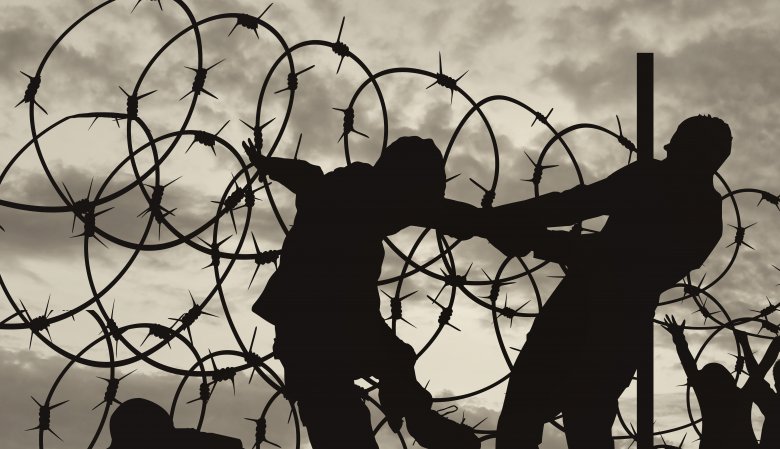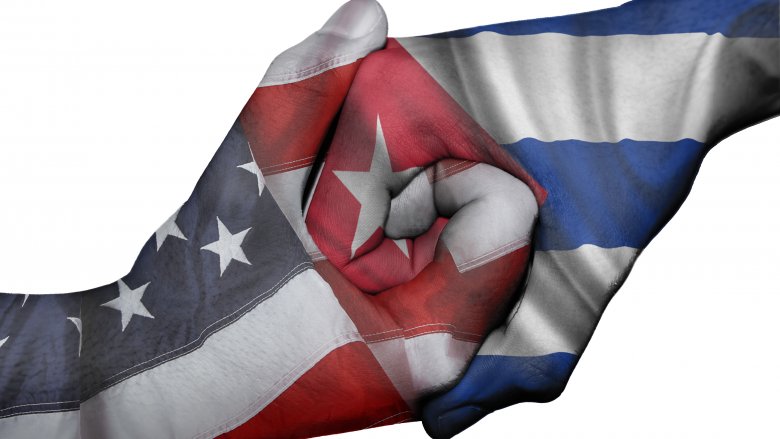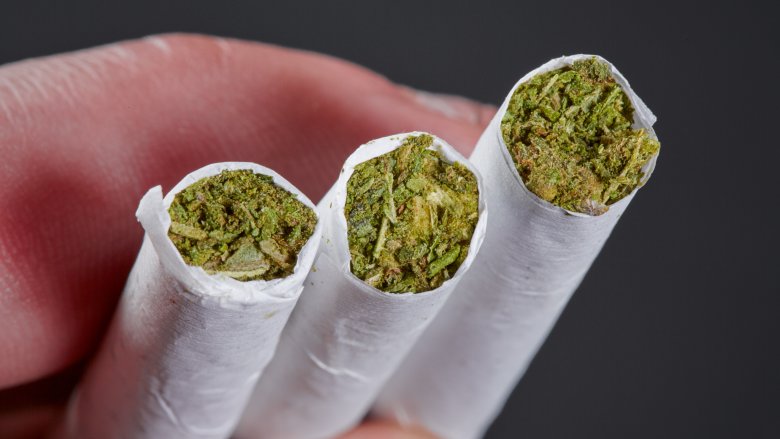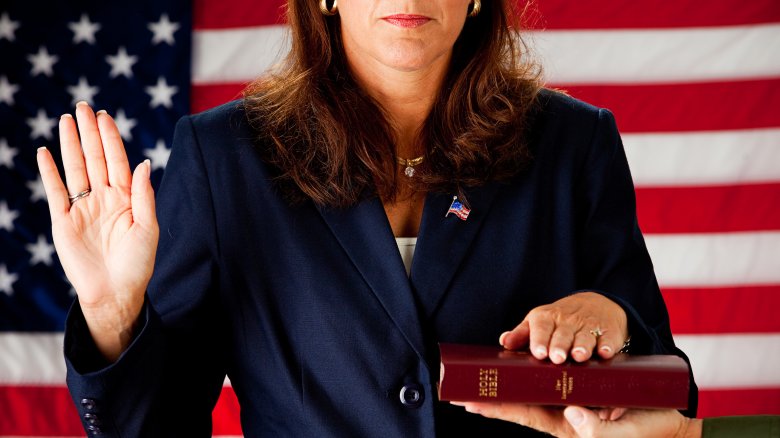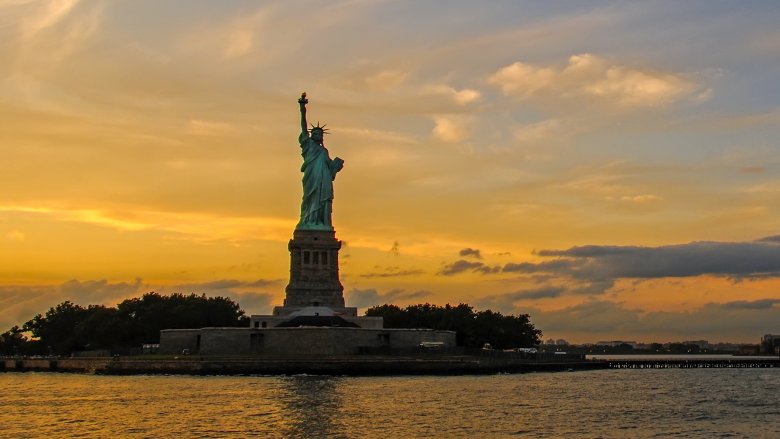Things That Became Illegal For Ridiculous Reasons
For the most part, the mandates that dictate our federal and regional regulations — like not cheating on income taxes and trying not to murder anyone – are in place for pretty darn legitimate reasons. At the same time, not every law comes from genuine or even honorable intentions. Motivations for some decrees are downright ludicrous or even mean-spirited. And when they aren't just bizarre, sometimes they're discriminatory enough to make you wonder whether the laws should still be enforced.
Unofficial diplomacy with foreign governments
Lots of people have dissented with aggressive diplomatic actions of the U.S. government through the years, from World War II to the Vietnam War to U.S. involvement in Afghanistan and the Middle East. Most folks, on the other hand, don't zip across the sea to privately plead for peace with Kim Jong-un because most folks aren't Dennis Rodman. If they did, though, any would-be conflict resolution by private citizens is against federal law. To be clear, this is probably a great law to have. But it's also the kind of thing you wouldn't think a country would ever need because who would even try to do something like this? Glad you asked.
In 1798, a series of diplomatic missteps with the French government resulted in the Quasi-War with France. Less than thrilled with the idea of another war, Philadelphia Quaker pacifist Dr. George Logan took matters into his own hands. The troubled pacifist hightailed it across the pond to speak with the French foreign minister, the Marquis de Talleyrand, about a peaceful resolution. Although his efforts weren't successful, the newly formed republic railed against his undermining of their authority and enacted the Logan Act in 1799. (Of course, Logan couldn't even be prosecuted under the regulation because it wasn't illegal at the time he did it.)
The antiquated regulation recently returned to the forefront during the investigation into Mike Flynn and his alleged contact with Russia. It was also dusted off when a number of Senate Republicans contacted the Iran during the government's nuclear negotiations in 2016. The only time the government has prosecuted anyone under the Logan Act was in 1803 when a kook tried to secede from Kentucky and give a bunch of property to France. Other than that, it's just been used as a vague threat. OK, now it definitely seems like the kind of thing a country wouldn't really need.
Everything with Cuba
Sometimes, the ideological war goes a little too far. Communism and capitalism have been at odds since the former was first defined as a political movement. During the 1950s, things got a bit out of hand as witch hunts destroyed thousands of U.S. citizens and the U.S. nearly knocked nuclear heads with the Soviets. One of the greatest tragedies of the Cold War involved the Cuban people, who suffered greatly as a result of bad blood and long-running political grudges.
The Cuban embargo officially began at the tail end of the Eisenhower administration. Fidel Castro, the leader of the Cuban Revolution, succeeded the Batista government, enacting a number of reforms, de-privatizing industry, and normalizing relationships with other Communist regimes. Feeling the pinch, the U.S. cut off exports to Cuba in 1960, then axing imports in 1962 under President Kennedy. While the embargo aligned with the politics of the era, its popularity and relevance stretched thin over the decades, especially after the Cold War fell apart and the influence of communism dwindled.
Until recently, the U.S. and Israel were the sole members of the UN General Assembly still in favor of the embargo, until President Obama lifted a number of sanctions in 2014 and 2016, such as allowing the import of cigars and rum. President Trump could repeal Obama's executive order and has talked about doing so, but whether he actually will is unclear. Perhaps it's time to let this one go if for no other reason than to let ordinary Cubans return to a decent standard of living.
Marijuana
Originally a free-floating medicinal hack among the general populace –- especially popular in herbal remedies and tinctures widely available at most drug stores and advertised in magazines –- cannabis' association with Mexican immigrants may have helped take it down. Rampant prejudice at the turn of the century rapidly turned against the leafy green, as prohibitory laws sought to criminalize the drug and (often) the immigrants and poor people linked to it.
After Prohibition ended, top Prohibiter Harry Anslinger sought to stigmatize marijuana as an agent of destruction, causing its users commit acts of unspeakable depravity and even murder –- using scientific studies that he apparently pulled out of thin air. This was all done so he could keep himself gainfully employed, according to some historians. The death knell for cannabis, though, arrived during the '60s, when radicals and college kids started consuming it en masse. Its association with the Peace Movement and Vietnam War protests made it a target, especially after Richard Nixon became president in 1968. He pledged to rid the nation of the evil influence of drugs. During an interview with journalist Dan Baum, Nixon aide John Ehrlichman even admitted the true intentions behind the Controlled Substances Act of 1970.
"We knew we couldn't make it illegal to be either against the war or black, but by getting the public to associate the hippies with marijuana and blacks with heroin, and then criminalizing both heavily, we could disrupt those communities," he said, adding, "Did we know we were lying about the drugs? Of course we did."
The disturbing purpose behind marijuana's criminalization makes its continued prohibition extremely questionable at best. Despite its medical uses, studies concluding that it's relatively harmless, and decriminalization in several states, marijuana remains a Schedule I narcotic –- along with heroin, cocaine, and methamphetamines.
Atheists holding public office
The United States was founded as a land of religious tolerance and a melting pot of political ideology. Sometimes, ideology and faith are easily intertwined. Other times, they're oil and water. As a result, the Founding Fathers set out to protect religious freedom and create a government unbound or restrictive of spirituality in the United States Constitution.
The First Amendment guarantees the right to free expression and freedom from religious persecution, while Article VI of the Constitution provides that "no religious test shall ever be required" to hold public office. While states are bound by federal mandates, they can also enact their own statutes. As a result, several states – Maryland, North Carolina, South Carolina, Tennessee, Texas, Arkansas, and Mississippi, according to a 2014 New York Times article — still have laws on the books that bar atheists from government office. Take, for example, the Arkansas Constitution, which states: "No person who denies the being of a God shall hold any office in the civil departments of this State, nor be competent to testify as a witness in any Court."
Woefully out of step with ideas of "religious" tolerance and unenforceable due to their unconstitutional nature, the state bans also fall afoul of a recently enacted amendment to the Frank Wolf International Religious Freedom Act of 1998, guaranteeing equal rights for believers and nonbelievers alike. Yet the statutes remain on the books, perhaps due to a lack of political willpower or the continued mistrust of atheists in American culture. Either way, the public office impediment is overdue for an overhaul.
Immigration laws
U.S. history is rife with contradictory opinions about immigration. America is often believed to be a land gifted with gold-paved streets, a place for "your tired, your poor, your huddled masses yearning to breathe free." At the same time, the country's immigration policy was shaped by the Naturalization Act of 1790, which established a preferred migration status for free whites in the fledgling nation.
Nevertheless, immigration continued relatively unimpeded until the late 1800s, when the U.S. Supreme Court prioritized naturalization, beginning a series of sweeping immigration reforms. From the Chinese Exclusion Act in 1882 (which did exactly what it says on the tin), to the birth of the Federal Immigration Service (the precursor to the Immigration and Naturalization Service), the country increasingly used ethnic stereotyping to inform immigration policy.
Later legislation, such as the Immigration Act of 1924, initiated a "national origins quota system" to expressly limit the migration of ethnic minorities into the United States — seeking to preserve America's "racial homogeneity." How do we know? Because a report prepared for Congress at the time used those exact words. Laws like the Mexican Repatriation Act followed, which forced the deportation of at least half a million Mexican immigrants, many of them established U.S. citizens. Laws in the '50s and '60s cut out racial qualifiers, but immigration remains a hot-button issue in the modern political landscape. Hopefully, the ugly history of immigration laws and restrictions will inform future policy toward more beneficial and inclusive solutions.
Sodomy
Sodomy laws wiggled their way into American law early on as leftover religious restrictions regarding sexual activities that were happening just for fun rather than baby-making. Things were all business. Later, the legislation was used to punish offenders accused of public sexual acts, sexual assault, bestiality, and sexual abuse of a minor. (And that's mostly a good thing!) But in the '60s and '70s, anti-sodomy legislation was focused specifically on homosexual men, creating a hostile environment for an entire subset of the populace while also regulating the private lives of U.S. citizens.
For several decades, many states prosecuted gay men for engaging in consensual sex, leading to protests and outright battles like the Stonewall riots and eventually a series of legal battles that led to the Supreme Court on several occasions. Eventually, a number of states either removed or acknowledged the discriminatory practices of the laws, cutting them from their legal canon. In 2003, anti-sodomy laws were ruled discriminatory by the United States Supreme Court in the landmark case, Lawrence v. Texas.
But years later, only Virginia and Montana had repealed their statutes, according to USA Today. Twelve other states, including Kansas, Utah, Florida, Louisiana, North Carolina, Texas, Michigan, Idaho, Mississippi, Kentucky, South Carolina, and Oklahoma, still banned sodomy as of 2014, despite the illegitimate nature of the laws. Sure, it was so 1970s, but seriously, what was ever wrong with free love?
Blue laws
Prohibition, the federal ban on alcohol, lasted from 1920 to 1933. Largely the product of a rising tide of evangelical temperance groups around the country, the origins of the 18th Amendment to the Constitution actually predate the 20th century by some time. In fact, they're rooted in "blue laws" that first hit the books in the early days of United States.
The name likely came from 18th-century slang, in which "blue" meant "rigidly moral." These statutes criminalized engaging in secular activities on Sundays, including drinking alcohol, traveling, enjoying entertainment, and working. Although the harsher edges of these laws eventually fell out of favor, prohibitions of alcohol sales remained on the books for decades, especially in heavily evangelical states –- much to the dismay of Sabbath drinkers everywhere.
Texas, Tennessee, Utah, West Virginia, South Carolina, North Carolina, Alabama, Indiana, Oklahoma, Mississippi, and Montana all ban Sunday alcohol sales, according to The Guardian. Minnesota is the only state since then to repeal its ban, according to the Minneapolis Star Tribune. Apparently, someone apparently forgot to mention that Prohibition ended decades ago.
Hard drugs
Criminalization of Illicit narcotics represents a decades-long ebb and flow across the national consciousness. Even in these somewhat tolerant times, the idea of children's cough syrup made with cocaine or injured citizens relieving their pain by ordering Bayer heroin from a catalog still seems astonishing. But the so-called "hard drugs" of the modern era were mostly unregulated before the late 1800s.
These drugs can definitely be harmful, and it's probably good that they're controlled. But the first efforts to regulate narcotics were just thinly veiled attacks on ethnic groups. California first cracked down on opium in 1875 in an effort to repress the Chinese population, which many believed were stealing American jobs. (Sound familiar?) Also, a growing resentment among Southern whites against newly freed black Americans resulted in cities like New Orleans regulating cocaine, often associated with black recreational use.
Decades of fear-mongering and racism culminated in the aforementioned Controlled Substances Acts of 1970, which cracked down on any non-prescription drugs, something Nixon aide John Ehrlichman later admitted was a deliberate act to destroy the anti-war movement and harass black Americans. The War on Drugs soldiers on to this day and has devastated many citizens with overstuffed stints for relatively minor infractions. Drug policy is still a polarizing subject, but here's hoping we can work out some laws that help addicts get what the help they need and reduce the stress on our prison systems.
